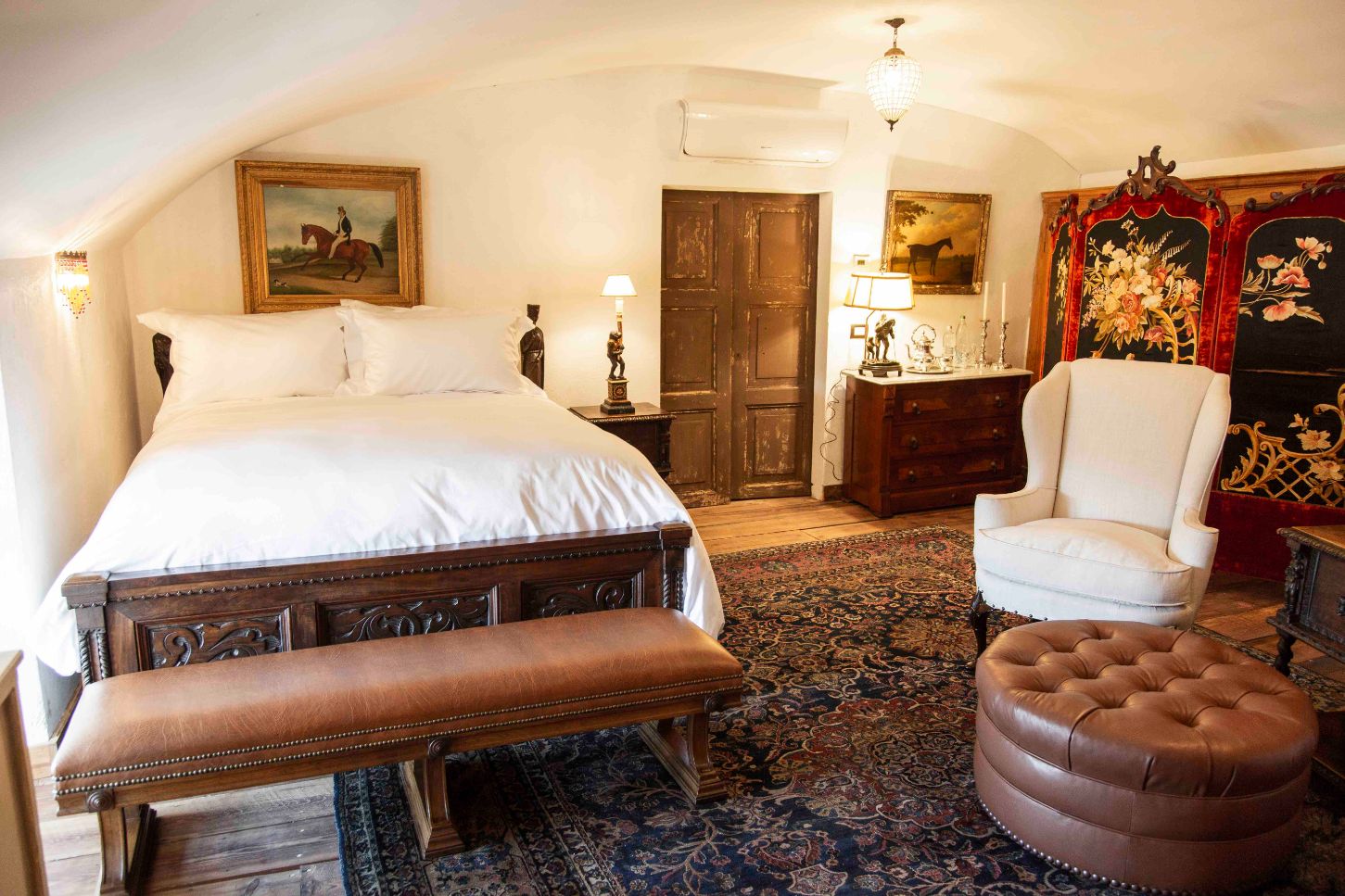Italy Resorts
This Castle Retreat Offers Silence and Luxury in Italy’s Piedmont Region
resorts

In the sleepy Italian commune of Casalborgone, a recent castle restoration has injected a quiet splendour into the rolling countryside

In the sleepy Italian commune of Casalborgone, a recent castle restoration has injected a quiet splendour into the rolling countryside
There are millions upon millions of dollars’ worth of antiques inside Castello di Casalborgone, a lavishly restored 18th-century castle in the rolling countryside of Italy’s Piedmont region. Yet its owners believe the item of most value is the quiet.
It is hard to argue against this notion as I open an oversized casement window, inviting the crisp morning air into my opulent Broglia Suite. I take a moment to admire the charming Italian landscape, one of my favourite things to do, which here comes complete with the snow-capped Swiss Alps in the background.
“The thing that this place has that doesn’t exist any place else is this incredible peace and silence,” says Gary Douglas, American businessman, antiques aficionado and, as of 2018, Italian castle owner. “You sit at the castle and you hear the birds, the wind and the leaves. You don’t hear cars, planes, trains and buses. That’s very unusual.”
There is quite a lot about this experience that is unusual. First of all, I am in a castle. Luxury I may be acquainted with, but this is next-level extravagance. My suite, the most decadent of the castle’s 12 boutique rooms, is a veritable museum, meticulously restored and adorned with antiques and artworks that ooze intrigue. The bedspread alone cost US$12,000. It was hand-crafted in Jaipur using gold thread and, for that reason, I am politely asked to refrain from having sex on it during my stay, although under is okay. I am a married woman travelling alone so I am not sure what to make of the request, but I kindly (and easily) oblige.
Also unusual, during lunch one afternoon – a formal affair held in the dining room – we take an unscheduled break to accept a fresco delivery. I watch as four brawny Italian delivery men manoeuvre the precious cargo up the castle’s front stairs and into the grand ballroom. Away comes the wooden housing, unveiling the beautifully muted tones of an 18th-century Tiepolo. Pinch me.
Chiara Dolza, Castello di Casalborgone’s gracious host, is the most starstruck among us. A graduate of art history, she tries to articulate the significance: “That you can touch it…” she trails off in awe as she rests a hand on the frame. “I will never wash my hands again.”
There is something else unusual about my stay. Not long after meeting Douglas, I am introduced to a number of his colleagues. Warm and hospitable, they are fellow Castello di Casalborgone investors and happen to be in town – an apparent rarity – during my stay. They are also Access Consciousness ‘facilitators’. Douglas founded Access Consciousness, a movement based on the idea that consciousness can shift anything, in 1995.
I am unsure what to make of Access Consciousness. Thankfully though, analysing Douglas’s career is not my assignment. Instead, I am charged with depicting Castello di Casalborgone and, on that, my mind is considerably clearer. This is a special place.
Douglas came across Castello di Casalborgone quite by accident. In fact, the septuagenarian believes the castle found him, rather than the other way around. He feels similarly about the interiors. Douglas handpicked every item in the restored property, aided by his knack for spotting treasures at flea markets, estate sales, garage sales and antique shops. Noteworthy pieces include a 300-year-old Aubusson tapestry, candlestick covers from the last Kings of Iran and Baccarat chandeliers from Persia. Another tapestry, now hanging Tiepolo-adjacent, is believed to have once belonged to Hitler. The rumour alone demands attention.
Douglas developed his taste for the finer things in life at a young age, inspired by his aunt. “She ate off of fine china, she drank out of crystal glasses and she had sterling flatware to eat on every day. I thought, ‘I want to live like this’,” he explains.
He has attempted to recreate this hedonism at Castello di Casalborgone, and has succeeded. When he purchased the property, it had been empty for 40 years. It took just one to reinstate the Renaissance-esque magnificence that now fills the centuries-old castle walls (although, when shopping, Douglas isn’t loyal to any one era).
There was local resistance to the sale, which continued throughout the restoration, but Douglas says Casalborgone residents have come to embrace the changes. After all, the castle is once again part of community events and the grounds are open to the public.
“I really wanted us to be a contribution to the community,” Douglas explains. “I didn’t want this to be somewhere we were taking away. That’s not really my perspective in life,” he says.
There are no TVs at Castello di Casalborgone. No sound system either. You are welcome to enjoy your own digital entertainment, but only with headphones. The library boasts more than 7,000 books and is enveloped in the musty vanilla scent of their collective age. The gardens are expansive, tranquil and perfect for aimless wanders. Wander a little further and the commune of Casalborgone offers all the charming sights you’d expect from a small Italian village: a quaint and well-attended church; a fruit shop dominated, fittingly, by greens, reds and whites; a schoolyard bursting with young exuberance; an espresso bar… and another, and another; all peppered with the colour and delight of brimming window box planters.
One macchiato down, it takes double-shot-sized strength to decline a second cup of rich Italian coffee, but I am not chasing a caffeine high. Quite the opposite. I am headed back up the hill to my castle. A place of calm. And of restoration in more ways than one.
Latest Articles
Don't miss the latest from Luxury Travel
